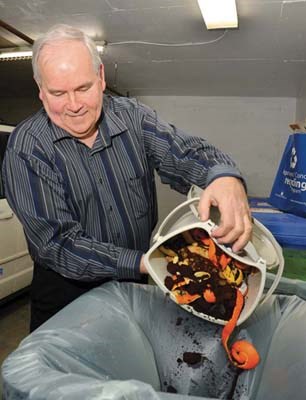The City of New Westminster is aiming to be the first city in the region to provide food scrap collection to all residences.
Council has approved a staff recommendation to mandate a citywide multi-family food scraps recycling program starting July 1. The city launched a pilot project on April 1, 2011 aimed at increasing recycling rates in the Royal City.
"Based on the positive outcome of the pilot project, staff recommend the implementation of a full-scale multi-family foods scraps collection program for the multi-family sector," said a report to council. "A citywide mandate for both single family and multifamily sectors to have access to food scraps collection would be a first in the region, further highlighting the city's commitment to waste diversion."
Coun. Jonathan Cote said New Westminster has made a lot of progress with its recycling programs and has become a leader in the Lower Mainland.
"This really takes us to the next step," he said about collecting food scraps from multi-family residences.
A staff report states that the pilot project has been very successful and well received by residents. Food scraps are collected from single-family homes and several multi-family residences participating in a pilot project.
"I think it's turned out to be a very good program," said resident Doug Whicker, whose building has been involved in the pilot project. "It is well received by the residents. We are putting out somewhere around two-anda-half big containers of organic waste every week."
In addition to recycling organics, Whicker said the pilot project has increased awareness about recycling and overall recycling has risen in the building as well.
"When we first started the food scraps recycling, we were using nine blue bins for the regular recycling. We are up to 13 bins," he said. "We are filling them."
Whicker estimates that the regular garbage has been reduced by 25 to 30 per cent as recycling has risen.
"It's very popular. I was quite surprised," he said about the food waste recycling. "They kind of took me kicking and screaming into it. - The fact is it is very popular."
According to a staff report to council, all buildings that are participating in the pilot program have clearly reduced waste volumes and many have been taking advantage of cost savings as a result of fewer waste bins or reduced collection frequency.
"On average, buildings saw a 25 per cent reduction in waste, and for one building there was a 50 per cent reduction in waste collection frequency," stated the report. "Also associated to the food scraps pilot, there was an increase in recycling in general. Every participating building in the pilot requested additional totes to facilitate increased recycling demands."
The report noted that there have been a few minor issues with the program related to liners in collection carts occasionally slipping out of place. A different type of collection cart is being proposed to help address this problem.
"There is also the 'ick factor' associated with a communal collection cart for food scraps," stated the report. "To address this, carts in need of cleaning can be swapped upon request. Regular weekly collection limits odours, as well as provides an opportunity for regular inspection of the carts for cleanliness or need for replacement by collection drivers."
According to the report, 88 per cent of participants in the multifamily recycling pilot project who responded to a survey expressed an interest in a citywide multi-family foods scraps collection program.
"No respondents to the survey were opposed," stated the report. "The pilot project provided feedback and data necessary to determine the need to further expand this program and continue to meet the waste diversion mandate."
www.twitter.com/TheresaMcManus



